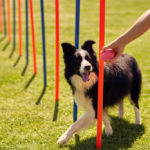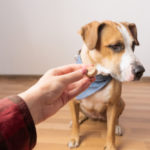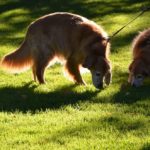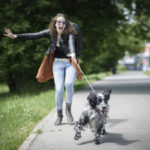As puppies, dogs that nip and bite when excited are super cute, and as their teeth are still small, it’s nothing but a game that sometimes tickles.
However, as they grow, dogs that aren’t trained to stop biting will continue to do so when excited or feeling playful, and the bigger they get, the sharper the teeth, and the more harm they will accidentally do.
There is nothing wrong with dogs getting excited and playful, and getting the urge to nip, as it they do so out of no ill-intent, and it is a natural behavior in canines.
However, they need to be trained to not bite when excited, or when playing, because as adults their teeth can cause a lot of harm and damage, and you could get seriously hurt.

The question is, how do you train your dog not to bite when excited? Or rather, how do you get a dog to stop nipping when excited or in a playful mood?
Ideally, you begin training them when they are puppies so that you cut that sort of behavior out from the root. But you can still train an adult dog to stop biting, it will just require patience and consistency.
Why Do Dogs Bite When Excited?
Before we get into the ins and outs of what to do in order to stop your dog from nipping, it might be useful to understand why dogs bite when excited in the first place.
That way, you will know more about the reason behind their behavior, and you can adapt the training in accordance with this.
Here are some of the main reasons why dogs bite when excited.
They Are Feeling Playful
When dogs get excited, they usually also become extremely playful and hyper, sometimes even clumsy due to the burst of energy they get! And the main way in which they show playfulness is through nipping at your hands or other parts of your body.
In part, they do this to grab on to the nearest thing, in order to play with it. But also, when they go for your hands or feet, it’s their way of trying to pull you into their playing, so that you engage with them.
And as you usually use your hands to interact with them, that is what they usually go for. Essentially, they nip at you to get your attention, and to force you to engage and participate with the excitement that they are feeling.
They Think That’s What You Like
Do you know when a puppy starts nipping and trying to bite at your hands, and it’s so cute that you praise them and go “aww” at them a lot? Yeah, well dogs remember this, and they take it as a reinforcement of their behavior.
That to them, basically says that you enjoy them biting at your hands and that it is a good way for them to get your attention, so they absorb it as a habit and it continues on into adulthood.
On the other hand, if you yell out in pain every time they nip at you, and still continue, it could be that they are interpreting your noises as enjoyment (since dogs communicate differently, and it’s easy to confuse a sad noise with a happy one).
Basically, your dog could be biting you because they think that you enjoy it and take it as a sign of playing together and sharing good things.
It Is Instinctive Canine Behavior
Dogs communicate and play with each other in many different ways, and one of the instinctive behaviors that they have, even as puppies, is nipping at each other playfully.
Puppies bite each other in order to bond and get used to one another, but also to learn to use their mouths, and to learn boundaries of when a bite is not okay.
When they get excited, it is easy for them to forget any sort of training, and to revert back to instinctive behavior, such as biting.
As A Form Of Self-Soothing
Being overly excited is not so different from feeling anxious, and one can very easily develop into the other.
So if a dog is feeling very excited, it might be trying to bite something in order to self-soothe and feel calm again. A lot of dogs relax by chewing, sucking, or biting on things, and you might just be the nearest thing to bite on.
So essentially, your dog might be nipping in order to be able to bite down on something, as a coping mechanism to lower the levels of excitement, which could be a bit overwhelming in certain situations.
Training Your Dog Not To Bite When Excited
Now that we’ve gone through all of the main reasons why dogs usually bite and nip when excited, it’s time to explain how to train them not to do as such, for safety reasons.
Before we get into the different tips and tricks you should use, we want to clarify one golden rule: do not punish your dog.
Punishing your dog for biting or nipping when excited is going to do no good, as your dog will not understand why the punishment is taking place, and instead of learning and understanding, they will just feel sad and scared.
It is very easy to instinctively lash out at your dog when you’ve been hurt from an exciting bite, but do not tap them on the nose, or shout at them, or hit them in any way.
Your dog is not trying to hurt you, it is an accident, and you simply have to train them to do other things when excited. So no punishment!
Okay, now that we’ve cleared that, here are some of the things you should do to train your dog to stop nipping when excited.
- As soon as your dog starts nipping, hand them a chew toy. Immediately redirect their attention from you to something that they are allowed to bite. Do this every single time. Eventually, your dog will begin to seek out the chew toys in the first place, rather than going to bite you.
- Distract your dog with an activity or game, or redirect their attention to something different with which they can release their excitement and energy. Maybe have them go out into the garden to play a specific game. Eventually, they will learn that biting is not the way to deal with excitement, but other things are.
- Train your dog to understand that biting you does not get your attention, and therefore achieves nothing. If they start nipping at you, ignore them. Do not give them attention until they are calm. Once calm, reward with treats, praise, and playing time. This will take a lot of time and consistency, but it is the most effective method.
Summary
In conclusion, in order to train your dog to stop nipping at you when excited, you have to make them understand that biting you is not an acceptable way of showing excitement and that biting you will not get your attention or any play time at all.
Redirect your dog’s attention, train them to bite on chew toys, and train them to calm down before they get anything good.
- 8 Signs That Your Dog Is In Heat - November 8, 2022
- Why Is My Dog Whining Whilst Carrying A Toy In Their Mouth? - August 17, 2022
- Reasons Why Your Dog’s Poop Is White And What To Do About It - August 17, 2022









